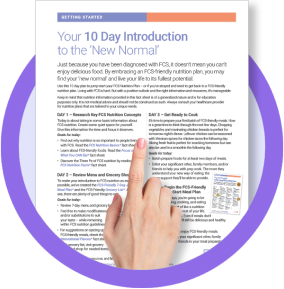Why are nutrition and lifestyle so important in familial chylomicronemia syndrome (FCS)?
FCS-friendly food plans and living habits may help prevent complications.38
Due to their inability to break down fat, people with FCS should limit their diet to less than 20 grams of total fat (about 1 tablespoon of olive oil) spread throughout the day.

Alcoholic substances should be avoided and simple carbohydrates like sugar, candy, juices, and soft drinks should be limited. Refined carbohydrates like white flour, white bread, white rice, and processed cereals can also cause triglyceride levels to increase to dangerous levels.
Two strategies that can also help are30,38:
- Working with a registered dietitian (RD).
- Taking a holistic approach to your health.
An RD can develop an eating plan that works for you and your family.
A registered dietitian or registered dietitian nutritionist (RDN) can create meal plans that allow you to enjoy eating, while also giving you the nutrients and calories you need for a healthy life, in a way that fits your lifestyle and family needs.

Click the 10 Day Introduction to the New Normal fact sheet (at right) to get started on your journey to an FCS-friendly lifestyle.

Take a holistic approach to health
Holistic care means treating the whole person25:
- Taking care of your body and mind.
- Making healthy food decisions.
- Focusing on getting regular exercise and plenty of rest.
- Choosing nutrition and lifestyle options that promote your best health and limiting those that worsen your condition.
Don’t forget to take care of your emotional and mental health, too.
- Take time for yourself and seek support.
- Relieve stress by going for a walk with a friend.
- Connect with other people who have FCS for support.
Your dietitian and other members of your healthcare team can help you find ways to take care of your whole person.
